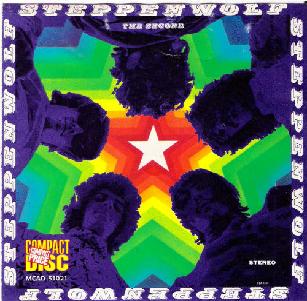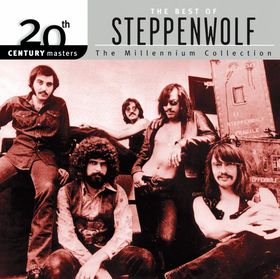
Steppenwolf was a Canadian-American rock band that was prominent from 1968 to 1972. The group was formed in late 1967 in Los Angeles by lead singer John Kay, keyboardist Goldy McJohn, and drummer Jerry Edmonton, all formerly of the Canadian band the Sparrows. Guitarist Michael Monarch and bass guitarist Rushton Moreve were recruited via notices placed in Los Angeles-area record and musical instrument stores.

John Kay is a German-born American rock singer, songwriter and guitarist known as the frontman of Steppenwolf.

Nick St. Nicholas is a German bandleader, bass guitarist, singer and songwriter; best known for his partnership in Steppenwolf.

Steppenwolf is the debut studio album by Canadian-American rock band Steppenwolf, released on January 29, 1968, on ABC Dunhill Records. It includes songs written by band members and songs written by others such as the Willie Dixon blues classic "Hoochie Coochie Man", retitled "Hootchie Kootchie Man".

The Second is the second studio album by Canadian-American rock band Steppenwolf, released in October 1968 on ABC Dunhill Records. The album contains one of Steppenwolf's most famous songs, "Magic Carpet Ride". The background of the original ABC LP cover was a shiny "foil", in contrast to later LP issues and the modern CD sleeve.

At Your Birthday Party is the third studio album by Canadian-American rock band Steppenwolf. The album was released in March 1969, by ABC Dunhill Records.

Monster is the fourth studio album by Canadian-American rock band Steppenwolf. The album was released in November 1969, by ABC Dunhill Records. It was their first LP with new lead guitarist Larry Byrom instead of Michael Monarch. The album was Steppenwolf's most political album, making references to important issues at the time, such as the Vietnam War.

Steppenwolf 7 is the fifth studio album by Canadian-American rock band Steppenwolf. The album was released in November 1970, by Dunhill Records. It is the first Steppenwolf album with new bass player George Biondo. The album’s numerical title reflects the fact that it was the band’s seventh album release for ABC/Dunhill records . While the album featured Steppenwolf's trademark rock and roll sounds, none of the songs were able to make the top 40. The album featured a cover of Hoyt Axton's "Snowblind Friend", their second cover of one of his antidrug songs. Along with "Who Needs Ya", it was one of two singles from the album which made the charts, but fell short of the top 40. The album track "Renegade" is autobiographical for lead vocalist John Kay, recounting his flight with his mother from the Soviet occupation zone to the West in 1948. The intro to "Earschplittenloudenboomer" is spoken by Kay partially in German.

Steppenwolf Live is primarily a collection of recordings from a single concert early in 1970 at the Santa Monica Civic Auditorium by Steppenwolf staged in support of their 1969 album Monster. Released in April 1970 by Dunhill Records, it contains Steppenwolf's well-known hits: "Born to Be Wild", "Magic Carpet Ride" and "The Pusher", as well as most of the songs from Monster, including three previous top 40 hits, as well as the top 40 hit "Hey Lawdy Mama" from this album.

16 Greatest Hits is a compilation album by Steppenwolf, released in 1973. It features some of their most famous songs, including "Born to Be Wild", "The Pusher", and "Magic Carpet Ride", and "Hey Lawdy Mama." The album consisted of the 11 tracks from the previous Gold: Their Great Hits album, in the same order as on the two sides of that earlier album, with the addition of the final two tracks on side 1, and the final three tracks on side 2.
Bubble Puppy is an American psychedelic rock band originally active from 1967 to 1972. They are best remembered for their Top 20 hit, "Hot Smoke & Sasafrass".
Richard Allen Podolor was an American musician, record producer and songwriter. His career started as a session musician in the 1950s, and he was best known as the producer of Three Dog Night.
Rushton Moreve was an American bass guitarist best known for his work with the rock band Steppenwolf from 1967 to 1968 and again in 1978. According to singer John Kay, he was an intuitive bassist with a melodic style that brought a non-commercial sound to the band, a technique exemplified on the hit he co-wrote with Kay, "Magic Carpet Ride".
The Sparrows was a Canadian blues rock band of the 1960s. Notable for being the first group to bring musician John Kay into the mainstream, the Sparrows later morphed into the popular heavy rock group Steppenwolf.

"The Pusher" is a rock song written by Hoyt Axton, made popular by the 1969 movie Easy Rider which used Steppenwolf's version to accompany the opening scenes showing drug trafficking.

George Michael Biondo is a musician who served as bass guitarist of the Canadian rock band Steppenwolf from April 1970 to October 1976. Born in New York, Biondo has been based in Southern California throughout a career as a session musician and songwriter.

Gold: Their Great Hits is a greatest hits album released by the Canadian-American hard rock band Steppenwolf. The album, released in 1971, charted at #24 on the Billboard Pop Albums charts and was certified "gold" by the RIAA on April 12, 1971. Initial pressings of the album came in a gatefold sleeve, with a detachable poster of the band.

20th Century Masters – The Millennium Collection: The Best of Steppenwolf, released by Universal Music as part of their 20th Century Masters – The Millennium Collection series, is a CD that collects material by Steppenwolf from 1968 to 1971. The compilation focuses on Steppenwolf’s Dunhill recordings, with the bulk of material coming from their Steppenwolf through At Your Birthday Party albums. While generally regarded as a solid representation of Steppenwolf’s early-period proto-metal work from the 1960s, there were no new tracks or previously unreleased songs included. It includes liner notes by Joseph Laredo and was digitally remastered by Erick Labson. It was certified Gold by the Recording Industry Association of America on October 29, 2004, the first output by Steppenwolf to earn such a designation since 16 Greatest Hits went gold on April 12, 1971.
Gabriel Mekler was an American songwriter, musician, and record producer who attained fame in the 1960s, helming albums for Steppenwolf, Three Dog Night, and Janis Joplin. He also collaborated with R&B singer Etta James for two critically acclaimed albums in the early 1970s, mixing blues, soul, and then topped it off with Genya Ravan production jazz and rock.














